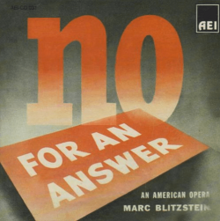
Summary
No For An Answer is a musical play by Marc Blitzstein.[1] It was staged by W. E. Watts at Mecca Temple, west 55th Street, New York, on Sunday, January 5, 1941.[2] Although it was supposed to have a limited engagement, it ran for two additional Sundays. There was no scenery and Marc Blitzstein was at the piano. It was an experiment under an agreement between the Dramatists Guild and Actors Equity. The cast included Olive Deering, Lloyd Gough, Martin Wolfson, Norma Green, and Curt Conway.[1] It marked the New York debut of Broadway icon, Carol Channing.[3][4] It was much discussed prior to its opening and Random House accepted it for publication just before its production.[5] Brooks Atkinson stated in his review of the work in The New York Times, "it is very exciting in performance, which is all that matters."[6] Although Aaron Copland called it one of "the most original works in that form composed in this county,"[7] the play was a failure.[8]
| No For An Answer | |
|---|---|
 Original cast recording | |
| Music | Marc Blitzstein |
| Lyrics | Marc Blitzstein |
After the first Sunday night performance, New York City License Commissioner Paul Moss issued a ban on further performances because the Mecca Temple lacked a theater license and the auditorium had many building violations. He warned that if anyone tried to present the show the following week, they would be stopped by police and firemen.[9]
The work was not in step with the times and no one would underwrite a full production. A later concert performance in 1960 (Blitzstein again at the piano) constitutes the entire performance history of the piece during Blitzstein's lifetime. Howard Taubman reviewing the 1960 production for The New York Times, said, "it bogs down in a swamp of pedestrian cliches."[10] The show finally received a fully staged production at the American Conservatory Theater in San Francisco on October 22, 2001.[3]
Plot edit
The plot of No For An Answer is the life and fate of the Diogenes Club, a social club of Greek-American waiters, hotel-workers, restaurant-workers, chefs, laundresses, chambermaids, taxi-drivers, who are out-of-work.[3]
Songs edit
|
|
Excerpted scenes edit
ACT I[11]
- War of the Beasts and the Birds, The (from Act I Sc.1)
- Gina (from Act I Sc.3)
- Secret Singing (Act I Sc.4)
- Argument, The: What Is Capitalism? (Act I Sc.5)
- Fraught (from Act I Sc.6)
- Dimples (from Act I Sc.6)
- Outside Agitator (From Act I Sc.6)
- Francie (Act I Sc.8)
- Did They Think They Could Get Away With That? (from Act I Sc.11)
- Insist Song (Finale Act I)
ACT II
- Penny Candy (from Act II Sc.1)
- In the Clear (from Act II Sc.1)
- Get Mine (Act II Sc.3)
- Expatriate (from Act II Sc.5)
- Weep for Me (from Act II Sc.7)
- Mild and Lovely (from Act II Sc.7)
- Lullaby (Act II Sc.9)
- Purest Kind of a Guy, The (from Act II Sc.10)
- Insist Song (Finale Act II)
References edit
- ^ a b Mantle, Burns, Editor, "The Best Plays of 1940-1941", Dodd, Mead & Company, p. 430
- ^ "No for an Answer". Retrieved 21 October 2014.
- ^ a b c "The Marc Blitzstein Web Site". Retrieved 21 October 2014.
- ^ Nemy, Enid (15 January 2019). "Carol Channing Dies at 97; a Larger-Than-Life Broadway Star". The New York Times. Retrieved 18 June 2023.
- ^ New York Times, March 7, 1940, p. 26
- ^ New York Times, January 6, 1941, p. 10
- ^ Gordon, Eric A., "Mark the Music: The Life and Work of Marc Blitzstein," St. Martin's Press, NY, p. 287
- ^ Shout, John D., "The Musical Theater of Marc Blitzstein", American Music, vol. 3, no. 4, p. 420
- ^ Gordon, Eric A., "Mark the Music: The Life and Work of Marc Blitzstein," St. Martin's Press, NY, pp. 202-203
- ^ New York Times, April 19, 1960, p. 40
- ^ "BlitzsteinWorks". Retrieved 21 October 2014.
Additional sources edit
- Cody, Gabrielle H.; Sprinchorn, Evert (2007). The Columbia Encyclopedia of Modern Drama. Columbia University Press. pp. 168–. ISBN 9780231144223. Retrieved 9 November 2014.
- Bordman, Gerald (2001). American Musical Theater: A Chronicle. Oxford University Press. pp. 577–. ISBN 9780195130744. Retrieved 9 November 2014.
- Mordden, Ethan (October 2013). Anything Goes: A History of American Musical Theatre. Oxford University Press. pp. 148–. ISBN 9780199892839. Retrieved 9 November 2014.


